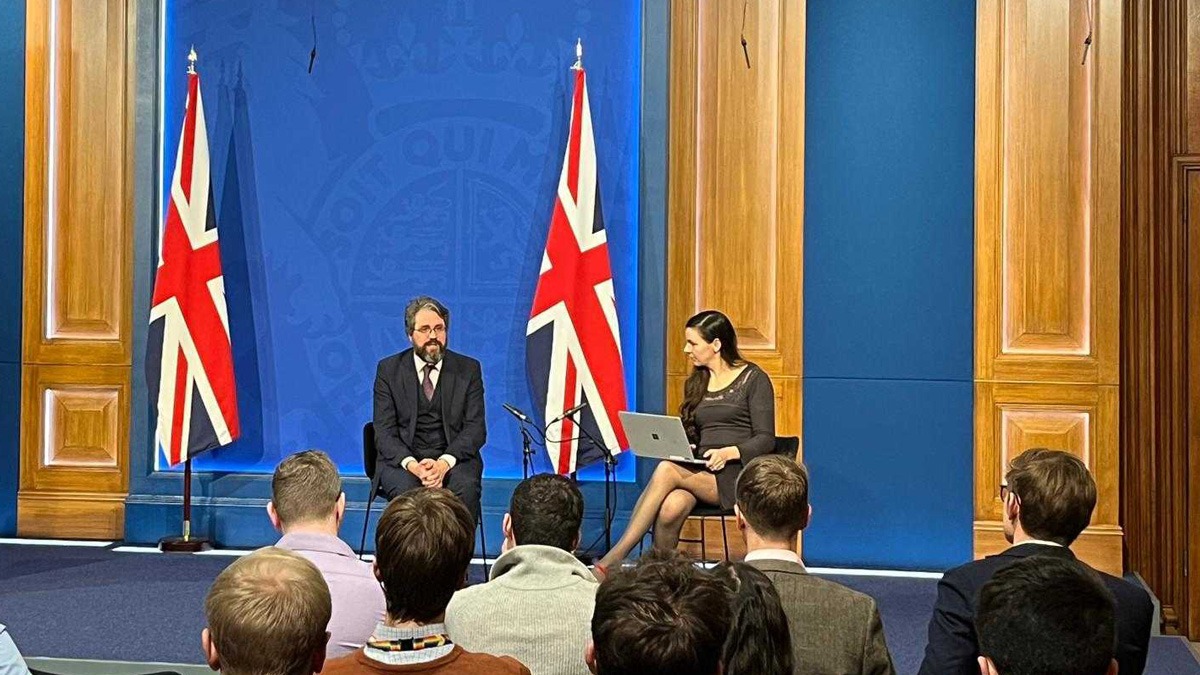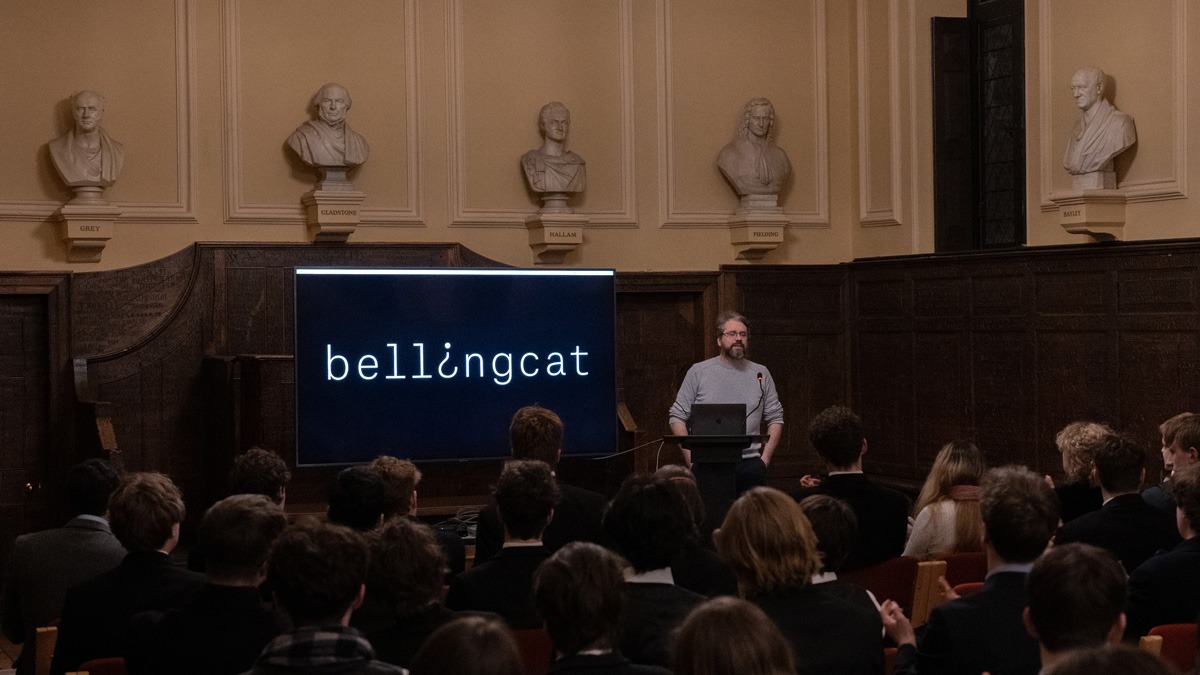

OSINT pioneer Bellingcat: Changing the world from the couch
Virginia Kirst

The international research network Bellingcat has helped open-source investigation methods gain worldwide recognition through investigations into the MH-17 crash and the use of chemical weapons during the Syrian civil war. Today, in addition to ensuring the best possible dissemination of their research findings as well as educational work, the organisation concentrates on ensuring that their findings have a solid basis and can be utilised within international courts.
Bellingcat is an international network for investigative research founded by internet activist Eliot Higgins in 2014. The Amsterdam-based organisation is known worldwide for their online investigations, which have shaped the perception of the global public.
Some examples include Bellingcat’s investigation into the use of weapons in the Syrian civil war, or their research finding out long before the public commission of inquiry that the MH-17 passenger plane had been shot down by a Russian missile system over Ukraine. Another includes their identification of the main suspects in the poison attack on Russian spy Sergei Skripal as being members of the Russian secret service.
Bellingcat specialises in conducting OSINT research: The verification and reconstruction of events and facts based on freely accessible online sources (open-source intelligence), using content such as cell phone photos, videos or satellite imagery. As a pioneer in this field, Bellingcat has ensured that this method is now used by editorial offices and organisations around the world to carry out independent online fact-checks.
They have done so by disclosing their investigations and making the research methods both verifiable as well as replicable, whilst further providing organisations and editorial offices with specialised training for their use. “The reason so many established organisations are conducting open-source research today is because we have trained them how to do it”, founder Higgins confirms.
Collaborations with the online network is based on ‘onion structure’
To understand the organisation’s work and structure, it is useful knowing how it came to life: Higgins officially founded Bellingcat in 2014 by means of crowdfunding. Yet even before its official establishment, Higgins had been researching the use of weapons in the Syrian civil war using OSINT tools from his living room. Publishing findings on his blog, his research results gained attention from established media outlets, which published results in their reports. Back then, Higgins was already working within a network of like-minded individuals on the internet, with whom he exchanged various information about sources and verification methods.
This community has remained intact to this day and has been merged into what Higgins refers to as “Bellingcat’s onion structure”: The core of Bellingcat consists of 40 permanent employees. The next outer layer is frequently made up of contributors who are not actually employed. Bellingcat involves such individuals or partner organisations in the planning of projects or within the search for new topics.
Then there is the community of organised volunteers – currently around 30-40 individuals – that Bellingcat trains and assigns tasks to. Beyond these three layers, there is a larger network community. These are the people that follow Bellingcat on their social networks or take part in discussions organised on Discord, thus contributing to research and providing feedback or recommendations.
From research to TV series and court hearings
Bellingcat’s way of working both requires and results in facilitating a maximum of transparency: “Collaboration with a wide range of organisations and volunteers is possible because we work with open-source materials”, says Higgins. Nobody reaches out to Bellingcat with secret sources. Instead, everyone within the network has access to the same materials yet uses different skills and methods to disseminate them and achieve results and findings.
Bellingcat itself publishes the resulting research on their website and via their social media channels. And in order to make the networks investigation methods and findings better known, Bellingcat also publishes books, documentaries, podcasts, and even streaming series – or sells the rights to enable such productions. Their media partners use the research in articles and international organisations use it for their own purposes – for example as evidence utilised and necessary for criminal prosecution before international courts.
The organisation is particularly active in the latter area: It has established a joint task force with the non-governmental organisation Global Legal Action Network. It is called “Justice & Accountability” and serves to develop processes ensuring Bellingcat’s open-source research findings can be used as evidence in international court proceedings. Especially unique about this department is that it is separated from the rest of the organisation. It uses its own communication channels and employees working there are not deployed in other areas of the network.
Turning existing information into valuable facts
The investigations that Bellingcat focuses on are determined and selected by their strategy. Higgins explains, “It’s about identifying events where information emerges and then turning it into reliable facts that can be used by various stakeholders.” The organisation does not see itself as the endpoint of the process, but rather as part of it: “The facts that we produce in this way can be very helpful for many people”, Higgins says.
Bellingcat’s expertise and capacities also play a crucial role here. The organisation operates within working groups specialising in various topics. In addition to research on wars and conflicts, these include conspiracy theories, far-right and MAGA networks as well as AI-generated pornography and deep fakes. Once a team is available, a new investigation in the specific realm can be conducted.
Simultaneously, Bellingcat makes sure that their conducted research and efforts cover as many regions of the world as possible. Their current focus is on the Global South, particularly Africa and Latin America, so that there is no knowledge gap between these regions and the rest of the world when it comes to OSINT. Because, says Higgins: “People in the Global South deserve accountability just as much as people in Europe and the USA do.”
How Bellingcat can serve as a role model
The Bellingcat network is already regarded as a great example of how OSINT research can be used at a low threshold to counter disinformation worldwide. Its efforts to further knowledge of such research methods and to equip as many people and organisations as possible with their tools, are particularly noteworthy. Equally remarkable is that it has been continuing to develop as an organisation instead of resting on its laurels or sticking to familiar topics. This is particularly demonstrated in the “Justice & Accountability” task force, as well as the special attention being paid to the Global South.








